Francis Kurkdjian, Dior’s nose, faces the biggest challenge of his career: The relaunch of Sauvage perfume
Perfumery star welcomes the media to a luxurious Utah wilderness
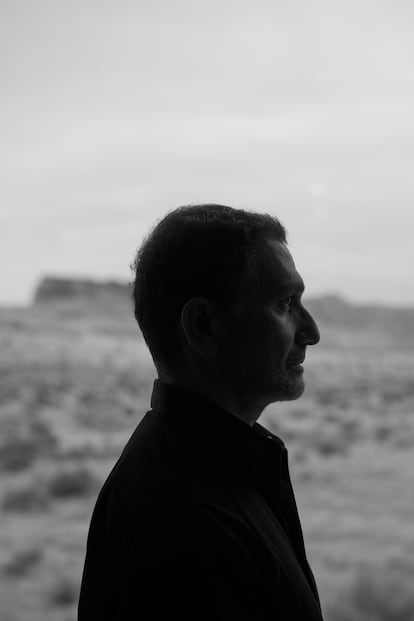
Calling Francis Kurkdjian detail-oriented is an understatement. A self-described creative director with a mathematical mind, before working at Dior, the perfumer carried out an extensive investigation of the French luxury house. It seemed like he was the one that was going to hire the brand, not the other way around. He spent a month preparing a 12-page guide to its main points of interest, from its most famous perfumes to its boutiques. “I also bought things online, to see how the process worked. In Paris, I went to stores, a secret shopper,” he recalls, seated between immense rocks in the Utah desert. More than three years have passed since he turned that booklet over to Dior’s president, full of suggestions and requests, including a list of everything he wanted to change if he was hired. They hired him. And he has largely made good on those proposals. Now, he is facing one of the house’s greatest challenges: the relaunch of Sauvage, the best-selling perfume not only of the brand, but in the world, including women’s and men’s scents. This month, he will release his Eau Forte version. It will be a challenge in terms of sales, its sector, and the company itself. Is he worried that people won’t like it? “I don’t care,” he says, loud and clear. “Is it good for Dior, is it what it needs? That’s not up to the people, but the house itself. If you think about the people, you forget the brand. The product is the icon.”

Kurkdjian’s determination is nearly legendary in the industry. Serious and rigorous, he peppers his speech with marquee statements and then qualifies them, such as when he says that he deserves his job, that not everyone is capable of doing his job, that he does not like to be called lucky, but rather, that he is audacious. In the world of perfumes, his name is becoming as famous as the scents in the bottles he fills. He has transcended the realm of connoisseurs and is almost a star in the eyes of the general public. None of this, of course, matters to him in the least. “I do my job to the best of my ability. I do my best to be at the service of perfumery. You can think I’m an icon or not, I don’t care,” he says, his gaze direct, free of false modesty. “What matters is to go beyond the limits. Maria Callas said it once in a very nice way, that she was at the service of music. If at my level I can do that, I’ll be happy.”
Kurkdjian allows himself to be photographed during the presentation of Sauvage Eau Forte in a remote corner of the western United States, at the Amangiri Hotel in Canyon Point, Utah, where EL PAÍS has traveled at the brand’s invitation. It’s still the middle of June, but temperatures are approaching 104ºF in this strange paradise in the middle of nowhere, comprised of some 30 carefully appointed micro-bunkers with all amenities and a superb swimming pool carved into the rock. The perfume industry is an imposing market whose sales, according to Statista, reached $58 billion in 2023 and are expected to continue to grow considerably, at around 3% every year. Dior, which is part of the LVMH group (whose fragrance division grew 12% in the first half of 2023, rising above $4 billion, according to Forbes), chose the hotel, one of the most exclusive in the world, to present the launch to representatives of around 20 international media companies. The nose poses, agile and formal, among curves created by the meandering Colorado river. He doesn’t bat an eye, but he can’t be too comfortable. Does the press attention bother him? “It’s part of the job. It would be completely irresponsible to think that anyone could do this job. It demands a lot and it’s not for everyone; I’m not saying that I’m great, that I’m the best. I’m at Dior because creating my own company, without money, was much more difficult.”
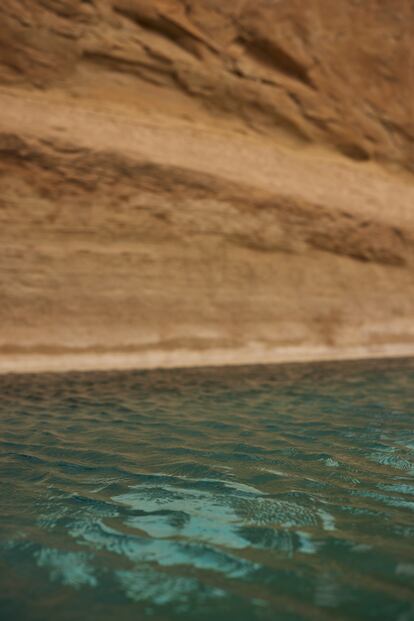
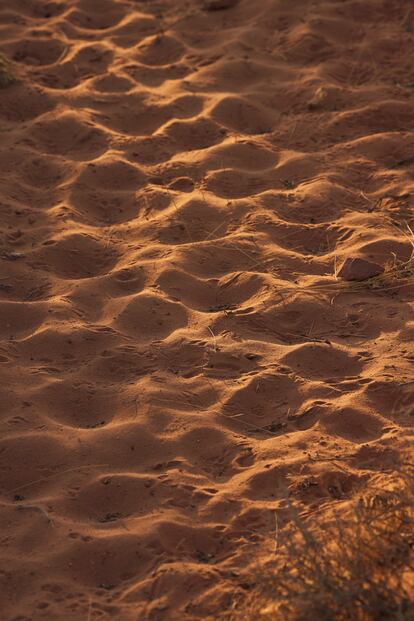
The company in question is the first atelier he launched in 2001, after which came the still-renowned Maison Francis Kurkdjian, founded in 2009 with his partner, Marc Chaya, who, upon meeting Kurkdjian, sensed his talent and thought that founding a house under his own name, an uncommon move in the perfume industry, had potential. That name had already attracted some fame in the industry when at 26 years old, Kurkdjian created an instant classic in Jean Paul Gaultier’s Le Male, which continues to enjoy healthy sales three decades after its debut. “Being at Dior is so easy in comparison with what I did before, since I was 25 years old,” he says, but later qualifies the statement, admitting that his current position is not “a simple job” either. “It’s easy because I have an understanding of what I do, of the materials, the formulas, the stories, of training people. I have had to do many things on my own and with my partner, with my own hands,” he says. Coming to the French house has been “the icing on the cake, because I do what I want and if I need something, I only have to ask for it. There’s a lot to do, it’s not easy, but I have everything I need to do the job as I want.”
Seeing him seated underneath the powerful air conditioning that insulates the luxurious, sand-colored hotel from the desert in which it nestles, clad head to toe in the brand he represents, one might fall into the temptation of seeing the nose as a chosen one, destined to this future of opulence. But he did not grow up in Grasse, nor were his parents linked to a world of fragrance and finery. His paternal grandparents were humble teachers in Turkey; his mother’s parents were sheep farmers and landowners in Armenia. Their holdings were lost after fleeing the 1915 genocide, and Kurkdjian grew up outside of Paris in an Armenian neighborhood. “Of course, 30 years ago, I wanted to create perfumes for Dior and Yves Saint Laurent, but I couldn’t imagine ever having my own house or working with artists, or even traveling,” says the creator of Baccarat Rouge 540, a viral perfume that came out a few years ago (not to mention 50 other fragrances for that luxury house), in addition to Narciso Rodriguez for Her; Elizabeth Arden’s famous summertime scent Green Tea, and Mr. Burberry and Her for the eponymous British firm. He has been responsible for installations in the Grand Palais of Versailles and Villa Medici. He can be serious, even short, on occasion, but Kurkdjian is true to his roots. “The first time I got on an airplane I was 12 and the second, 24. Many things have happened since where I come from, with my parents and my grandparents as immigrants. And that makes me happy.”
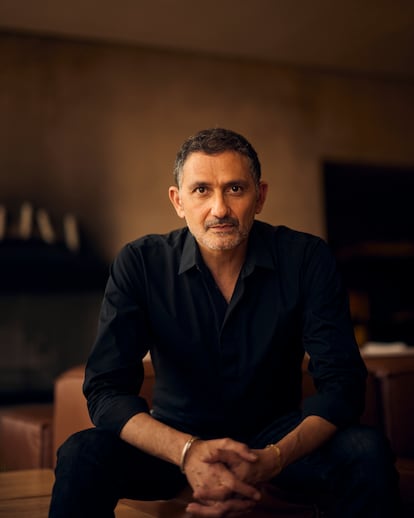
One of his goals is to become an inspiration for new generations. “For me, that’s something truly important. Because this is often thought of as a caste, passed down from father to son, that you have to be from a perfumer family and live in Grasse… I want to show young people that if you work hard, if you dare, you can achieve many things, without fear of people telling you it’s impossible,” he says, in a tone free of naiveté. “The majority of people don’t do things because they’re made to see them as unreachable, not because they can’t, but because they tell them, ‘You won’t make it because it’s hard.’ OK, but life is hard,’” says the man who was appointed knight in the order of arts and letters in France.
Contrary to what one might think, his work isn’t limited to pipettes. “I’m never in the laboratory. When you write an article, you’re not at the printer,” he says as a comparison. “I only need a paper and pencil. I can work from here and send formulas to Paris, I just need a wi-fi connection. That thing about how all perfumers are shown in laboratories is misleading.” Working for a house as titanic as Dior imposes many deadlines: by the end of September 2024, you have to have the 2025 and 2026 launches ready. How can he know what people will like a year and a half from now? “I don’t care,” he says. “You have to focus on the product,” he repeats.
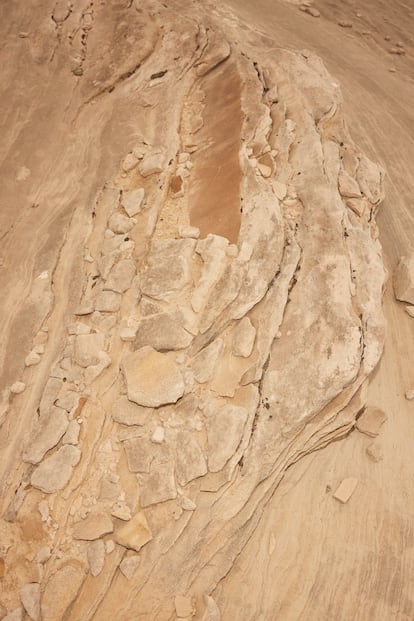

Disproving myths is fast work for Kurkdjian, who makes it clear that his work goes far beyond the blending of fragrances, which is often considered the be-all-and-end-all in the world of the perfumer. For him, storytelling holds weight. His communication with marketing teams is constant, in both directions. He tells them what he has created, and also tries to understand what the company wants. “I have to have the complete story, I need to understand the why. Why are we launching a new perfume? What is the reason? To preserve the business? To continue being number one? To give new shape to its history because it is not well-articulated? What do we want to do? What importance can Dior have today? Once you respond to all these questions, it’s easier to work because you have the story,” he says. From there, he has redesigned the house’s classics for women, like L’Or de J’adore, for babies like Baby Dior, and now, he has dared to imagine a new edition of the best-selling fragrance on the planet, used by King Charles III of England. Why? “Because when you are number one in the world, you can’t be content. You have to keep innovating, advancing. With Eau Forte we have created our own new technology and are putting something different on the market, that is innovation. And when you have a story to tell, it’s easy.”
His workload is enormous. Kurkdjian had flown from Paris to this lost corner of Utah, a nine-hour time difference, for just a couple of days. Afterwards, he would go to New York. Soon, Japan awaits. He is a creator, but also an ambassador for the French house, at the end of the day. The work is demanding, but he does it from scratch, aware of how hard it is to make name for himself and for his own brand. “When you begin from zero it’s much more demanding. When you work in such a beautiful organization, with people who know exactly what to do, talented… It’s a matter of being very organized.” He is that, even when he has too many things to do. He won’t stand for credit being given to extraneous factors, like his own luck. “No. I deserve it,” he laughs. Not even a little bit, a touch? “A little touch of luck is good, but it’s not luck, I assure you. I prefer audacity to luck. It’s a word I like better than luck because it’s associated with work. Christian Dior was audacious, if you look back and see how at the beginning, they wanted to rename his house and he refused. When you see videos of him, he is very shy, very correct. It’s odd because he’s quiet and discreet. It’s hard to imagine him raising his voice and saying, ‘This has to be named after me.’ That’s audacity. You have to be bold at Dior, it doesn’t work on luck.”
He knows the history of the perfume house and its great founder by heart, he says. It forms part of his inspiration, but of course, asking where his inspiration comes from strikes him as corny. “It doesn’t come, of course,” he says. The key is to know one’s origins in order to later have a good story to tell. “You have to create stories but then kill them, create them and kill them, until you think you have the perfect one,” he says.
His own story, which began three years ago with a letter sent to the house, almost seems made-up. It all began when he found out there was a vacancy and of course, raised his hand. Who wouldn’t say, “me, please”? “No, I didn’t say please,” he corrects. “They’re lucky I’m here. I didn’t beg. I told them, ‘I have things to say, will you listen to me?’ It was a couple of lines or three. ‘I hear you’re looking for someone. I’d like to be considered, are you interested in me and my vision for Dior? Thank you.’ They couldn’t say no.”
Sign up for our weekly newsletter to get more English-language news coverage from EL PAÍS USA Edition
Tu suscripción se está usando en otro dispositivo
¿Quieres añadir otro usuario a tu suscripción?
Si continúas leyendo en este dispositivo, no se podrá leer en el otro.
FlechaTu suscripción se está usando en otro dispositivo y solo puedes acceder a EL PAÍS desde un dispositivo a la vez.
Si quieres compartir tu cuenta, cambia tu suscripción a la modalidad Premium, así podrás añadir otro usuario. Cada uno accederá con su propia cuenta de email, lo que os permitirá personalizar vuestra experiencia en EL PAÍS.
¿Tienes una suscripción de empresa? Accede aquí para contratar más cuentas.
En el caso de no saber quién está usando tu cuenta, te recomendamos cambiar tu contraseña aquí.
Si decides continuar compartiendo tu cuenta, este mensaje se mostrará en tu dispositivo y en el de la otra persona que está usando tu cuenta de forma indefinida, afectando a tu experiencia de lectura. Puedes consultar aquí los términos y condiciones de la suscripción digital.









































